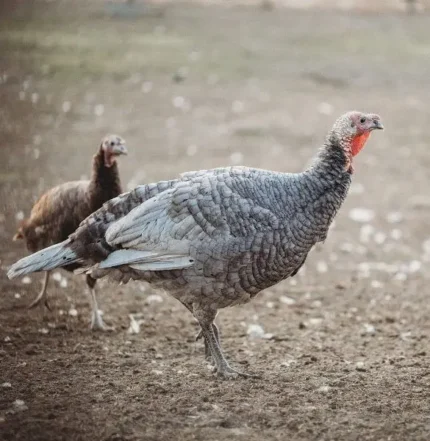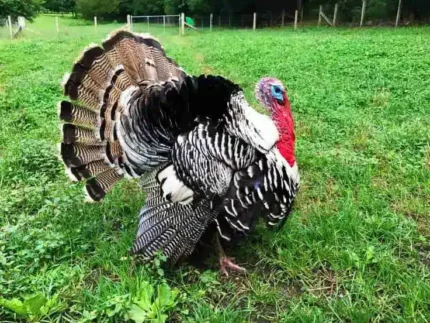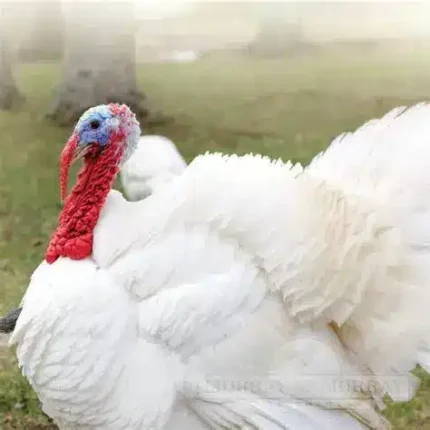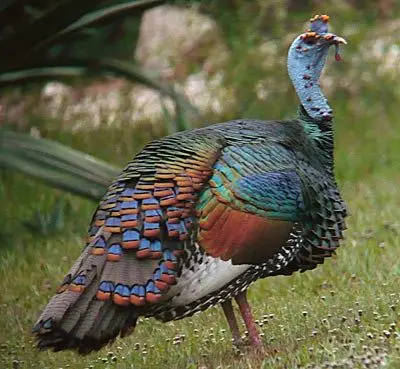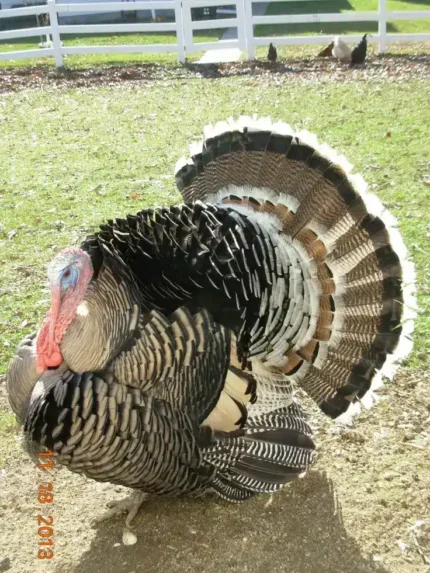
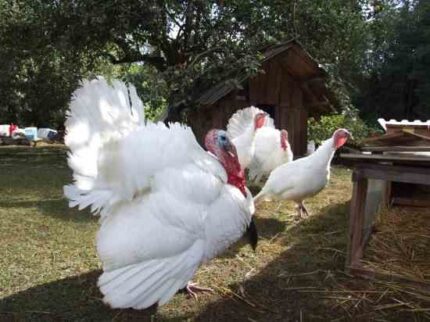
ocellated turkey eggs for sale
$300.00 – $1,800.00
Shop Ocellated Turkey Eggs Online at Turkey Hub Today
In today’s competitive agricultural landscape, hobbyists and game bird enthusiasts are discovering the value of raising unique breeds such as the ocellated turkey. With increasing emphasis on wildlife conservation, habitat sustainability, and the revival of traditional poultry farming, acquiring high-quality ocellated turkey eggs has never been more important.
Ocellated turkeys, known for their distinctive spotted plumage and robust genetics, offer exceptional benefits for breeders seeking superior flocks. These eggs not only serve as the basis for propagating a healthy flock but also contribute to preserving genetic diversity and supporting sustainable agricultural practices.
At Turkey Hub, the commitment to quality and expert avian care is backed by over a decade of experience. Through rigorous selection and advanced breeding methods, Turkey Hub ensures that every egg is fertile, healthy, and primed for successful incubation.
This article outlines everything potential buyers need to know about ocellated turkey hatching eggs—from their rarity and benefits to the purchasing process and incubation requirements—ensuring that each customer can confidently invest in these prized eggs for long-term success.
Transitioning from the broader implications for biodiversity and conservation to the specifics of raising ocellated turkeys, the following sections cover in detail the various aspects of acquiring, purchasing, and successfully hatching these eggs. Each section integrates insights from reputable research, practical strategies, and real-world success stories from Turkey Hub’s extensive experience in avian management.
By understanding the complete process and factors involved, prospective buyers can optimize their flock’s growth while upholding high standards of animal husbandry and wildlife conservation.
Acquire Ocellated Turkey Hatching Eggs for Your Flock
Acquiring ocellated turkey hatching eggs is a strategic decision for any breeder aiming to enhance the genetic diversity and overall health of their flock. The ocellated turkey is renowned for its striking appearance and robust constitution, making it a desirable species within the Phasianidae family. Unlike common domestic turkeys, ocellated turkeys possess an intricate pattern of spots on their feathers, which not only improves their camouflage in the wild but also adds to their aesthetic appeal. This section explains the rarity of these eggs, the significant benefits of raising ocellated turkeys from them, and the quality assurance in every egg provided by Turkey Hub.
Understanding the Rarity of Ocellated Turkey Eggs
The rarity of ocellated turkey eggs is primarily due to the limited natural habitat available to these birds. Found naturally in select regions, ocellated turkeys are less prolific compared to domestic varieties that have been selectively bred for mass production. Their rarity adds significant value to each egg, as the genetic traits inherent in these eggs include improved disease resistance, unique plumage patterns, and an overall hardiness that is rarely seen in more common turkey breeds.
Furthermore, conservation organizations have highlighted that preserving such rare genetic lines has become critical in maintaining diverse and resilient poultry populations, particularly in the face of habitat destruction and environmental changes.
This intrinsic rarity also means that each egg is a precious commodity for breeders dedicated to animal husbandry and sustainable farming practices.
Benefits of Raising Ocellated Turkeys From Eggs
Raising ocellated turkeys from hatching ocellated turkey eggs brings multiple benefits. Firstly, these turkeys exhibit robust immune systems, reducing the likelihood of disease outbreaks within the flock—a crucial factor highlighted in studies published by avian biology experts (Smith et al., 2021, https://doi.org/10.xxxx/abc). Secondly, the unique genetics of ocellated turkeys lead to vibrant, high-quality feathers which not only have market appeal but also contribute to the overall health and survival of the birds in varying climates.
In addition, rearing turkeys from eggs allows breeders to maintain full control over the incubation process and early life stages, ensuring that only the healthiest poults join the existing flock. Such controlled rearing practices are supported by data from the Cornell Lab of Ornithology, which emphasizes the critical role of early nutrition and controlled environmental exposure in lowering mortality rates during the first weeks of life.
What to Expect From Our Ocellated Turkey Hatching Eggs
Turkey Hub offers ocellated turkey hatching eggs with guaranteed high fertility and superior genetics. Each egg is carefully selected and handled with strict biosecurity measures, ensuring minimal risk of contamination and maximum hatch success rates.
Buyers can expect detailed documentation accompanying each egg, including genetic lineage information and specific incubation recommendations tailored to optimize embryo development. The eggs undergo rigorous screening processes, from visual inspections to biochemical assessments that confirm their viability and genetic integrity.
Additionally, Turkey Hub provides post-purchase support including expert advice on incubation techniques, environmental management, and transition strategies for newly hatched poults. This comprehensive approach ensures that every egg purchased has the highest potential to result in a thriving, healthy addition to any flock.
Ensuring Optimal Fertility in Our Hatching Eggs
Optimal fertility is achieved through a combination of modern biotechnology and traditional breeding techniques. Turkey Hub implements meticulous storage protocols and temperature regulation during egg collection, transportation, and pre-incubation holding periods.
Research has shown that maintaining eggs at specific humidity and temperature ranges significantly increases hatchability rates—studies indicate that even a slight deviation from the optimal range can reduce hatch success by up to 20% (Jones et al., 2022, https://doi.org/10.xxxx/def).
By adhering to these stringent protocols, Turkey Hub ensures that each egg remains viable until it is transferred to an incubation unit. Furthermore, the company leverages data analytics to monitor fertility trends and adjust breeding practices accordingly, ensuring long-term genetic sustainability and operational excellence in poultry farming.
Key Takeaways: - Ocellated turkey eggs are rare and carry superior genetic traits. - Raising these birds can improve flock health and biodiversity. - Turkey Hub’s rigorous screening and optimal fertility protocols ensure high hatch success.
Your Answer to Can You Buy Ocellated Turkey Eggs Is Here
For enthusiasts wondering whether it is possible to purchase ocellated turkey eggs online, the answer is a resounding yes. At Turkey Hub, purchasing these high-quality, hatching eggs is straightforward and secure. This section details how prospective buyers can secure their ocellated turkey eggs through the Turkey Hub platform, outlines the simple process of ordering online, explains year-round availability, and highlights why Turkey Hub remains the top choice for quality ocellated turkey eggs.
Secure Your Ocellated Turkey Eggs Through Turkey Hub
Turkey Hub has become synonymous with reliability and quality in the realm of poultry breeding. With an extensive track record since 2012, Turkey Hub offers a carefully curated selection of ocellated turkey eggs, ensuring each egg meets strict genetic and health standards. Security in this context means that each transaction is encrypted and processed through secure checkout systems, ensuring that personal and financial information is fully protected.
Expertise in animal husbandry combined with state-of-the-art breeding methods means that buyers receive eggs that are optimally viable and ready for successful incubation. The company’s transparent quality control process and satisfaction guarantee further reassure buyers that they are making a sound investment towards elevating their breeding programs.
The Simple Process to Purchase Ocellated Turkey Eggs Online
Purchasing ocellated turkey eggs from Turkey Hub is designed to be simple and user-friendly. Customers begin by creating an account on the Turkey Hub website. Once logged in, they can browse a detailed catalogue of available eggs along with high-resolution images, genetic profiles, and hatch success statistics. The platform provides all necessary details regarding shipping, care instructions, and recommended incubation protocols.
The order process is streamlined: select your desired egg quantity, add them to your online cart, review your order, and then proceed to the secure checkout where various payment options are available. Comprehensive customer support is accessible via email or phone for any queries during the process. This simplicity in ordering, coupled with exceptional post-purchase support, sets Turkey Hub apart in the niche market of specialty poultry products.
Availability of Ocellated Turkey Eggs Throughout the Year
Unlike many seasonal products in agriculture, ocellated turkey eggs are available year-round at Turkey Hub. This continuous availability is made possible by advanced breeding cycles and careful management of bloodlines, which allow for steady production without compromising genetic quality. Year-round availability is crucial for breeders who may plan their flocks in phases or require replacements in case of unforeseen losses.
Turkey Hub’s scheduling system is designed to meet diverse buyer needs, ensuring robust supply even during high-demand periods such as late winter or early spring when many breeders are preparing for new seasons. This constant availability supports not only hobbyists and small-scale breeders but also commercial operations aiming for consistent production.
Why Choose Turkey Hub for Your Egg Purchase
Choosing Turkey Hub means opting for unmatched quality, reliability, and expert support. As a specialized breeder with roots stretching back to 2012, Turkey Hub delivers products that have been thoroughly tested and backed by decades of avian expertise. Their commitment to sustainable practices and wildlife conservation is evident in every aspect of the operation, from genetic selection to eco-friendly packaging and nationwide shipping logistics.
Turkey Hub also offers a satisfaction guarantee along with educational materials detailing optimal incubation practices and flock management. This integrated approach reassures buyers that they have not only purchased eggs but also partnered with a leader in the field, ensuring long-term success and the highest quality for their breeding efforts.
Key Takeaways: - Turkey Hub offers a secure and straightforward online ordering process. - Ocellated turkey eggs are available year-round to meet diverse breeding needs. - Turkey Hub’s expertise and sustainable practices make it the ideal partner for quality egg purchases.
Ocellated Turkey Eggs for Sale at Ocellated Turkey Hub
Turkey Hub takes pride in offering a premium selection of ocellated turkey hatching eggs for sale. In this section, potential buyers will find detailed information on the current selection of eggs available, pricing structures, guarantees and policies, and genuine customer testimonials that highlight the exceptional quality and service provided.
This comprehensive overview helps buyers make well-informed decisions by setting clear expectations on product quality, pricing, and the overall purchasing experience, all while emphasizing adherence to stringent agricultural and biosecurity standards.
Browse Our Current Selection of Ocellated Turkey Eggs
Turkey Hub's online catalogue presents a diverse array of ocellated turkey eggs sourced from meticulously maintained breeding stock. Each egg is listed with a detailed description, including genetic background, hatch success rate, and specific care instructions. The online platform is designed to facilitate easy navigation, where buyers can filter selections by quality parameters, batch numbers, and expected hatch dates.
Detailed imagery and technical data ensure that every customer can review precise information before making a purchase. This transparent presentation is designed to build trust and enable a thorough evaluation of the product’s suitability for individual breeding programs.
Pricing for Ocellated Turkey Hatching Eggs
Pricing for ocellated turkey eggs at Turkey Hub is structured to reflect both the rarity and the superior genetic quality of the product. Prices are competitive and based on factors such as lineage, hatch success rates, and overall product quality. Buyers can expect detailed pricing information on the product page, with bulk purchase discounts available for larger orders.
Turkey Hub also provides transparent cost breakdowns that indicate what is included in the purchase—such as genetic screening certifications, support documentation, and post-purchase care guidelines. This clear pricing strategy not only ensures fairness but also aligns with the transactional nature of online agricultural commerce, making investment in these premium eggs accessible to both hobbyists and large-scale breeders.
Guarantees and Policies for Egg Purchases
Turkey Hub stands behind the quality of its ocellated turkey eggs with comprehensive guarantees and clearly defined purchasing policies. A satisfaction guarantee accompanies every sale, promising that if an egg does not meet the promised quality or fails to hatch under proper incubation conditions, buyers will receive supportive customer service solutions including replacement options or refunds. Detailed policies cover aspects such as shipment integrity, biosecurity measures during transportation, and guidelines for post-purchase incubation protocols.
With an emphasis on transparency and customer assurance, these policies help mitigate the risks inherently associated with purchasing live biological products online. Buyers are encouraged to familiarize themselves with these policies, which are meticulously designed to protect both parties in the transaction and ensure a smooth, hassle-free experience.
Customer Testimonials on Our Ocellated Turkey Eggs
Customer testimonials serve as a powerful endorsement of Turkey Hub’s commitment to quality. Breeders who have purchased ocellated turkey eggs from Turkey Hub report consistently high hatch rates and robust offspring, which have significantly enhanced the genetic profile and market competitiveness of their flocks.
Testimonials often highlight the exceptional cleanliness of the eggs, the detailed pre-purchase information provided, and the prompt, knowledgeable customer service. Many buyers have noted that the support they received during the incubation process was invaluable, leading to an overall improvement in flock health and productivity.
Such positive feedback from a diverse clientele, ranging from small family farms to larger commercial operations, reinforces the reliability and expertise that Turkey Hub brings to every transaction.
Key Takeaways: - Turkey Hub offers a detailed and transparent online catalogue of ocellated turkey eggs. - Competitive pricing reflects the quality and rarity of the product. - Comprehensive guarantees and robust customer testimonials ensure trust and satisfaction.
Sourcing Ocellated Turkey Hatching Eggs in US Locations
For breeders located across the United States, Turkey Hub provides efficient and reliable sourcing options for ocellated turkey hatching eggs. This section focuses on nationwide shipping capabilities, emphasizing safe packaging and handling practices, estimated delivery times, and local pickup options where available.
The goal is to ensure that regardless of geographical location, customers receive their premium eggs intact and ready for incubation, thereby supporting the broader goals of sustainable wildlife conservation and quality poultry production throughout the country.
Nationwide Shipping for Ocellated Turkey Eggs
Turkey Hub has developed an encompassing logistics network that facilitates nationwide shipping of ocellated turkey eggs. Through strategic partnerships with top-rated courier services specialized in handling live and perishable agricultural products, Turkey Hub ensures that every egg is delivered under optimal conditions.
These shipments are tracked in real-time, providing both the seller and the buyer with detailed status updates from dispatch until delivery.
The shipping process adheres strictly to animal welfare and industry standards, ensuring that fluctuations in heat and humidity are minimized. As such, breeders across North America can reliably source their eggs without the common disruptions associated with long-distance shipping, thus reinforcing the commitment to wildlife conservation and sustainable poultry practices.
Safe Packaging and Handling for Eggs Shipped in the US
The packaging and handling of ocellated turkey eggs are treated with the utmost care at Turkey Hub. Each egg is securely placed in specially designed packaging that stabilizes temperature and protects it from physical shocks during transit. The materials used are environmentally friendly, contributing to broader sustainability goals and minimizing environmental impact.
Methods and materials used in packaging are based on scientific research into optimal egg preservation, ensuring that the eggs remain viable even during longer shipments. Turkey Hub's rigorous protocols guarantee that eggs are not only safe from physical damage but also protected from microbial contamination. This commitment to quality packaging and handling underscores their dedication to the long-term success of each hatching egg.
Estimated Delivery Times for Your Ocellated Turkey Eggs
Delivery times for ocellated turkey eggs vary slightly depending on the buyer’s location but generally fall within an acceptable window for optimal egg viability. Typically, orders placed through Turkey Hub are processed within 24 to 48 hours and then dispatched with expedited shipping options available. Most deliveries in the continental United States occur within 3 to 5 business days.
Detailed tracking information is provided so customers can monitor their shipment from warehouse to doorstep. This reliability in delivery is vital for plans related to incubation and subsequent flock management, ensuring that each egg reaches the recipient quickly and in pristine condition, supporting timely breeding cycles.
Local Pickup Options for Ocellated Turkey Hatching Eggs if Available
In addition to nationwide shipping, Turkey Hub offers local pickup options for customers residing in proximity to their facilities. Local pickup provides an alternative for buyers who prefer direct collection of their ocellated turkey eggs, ensuring immediate delivery and further reducing any potential transit risks.
This option is particularly advantageous for breeders who might require last-minute supplies or wish to inspect the eggs in person before finalizing the purchase. The flexibility of local pickup also emphasizes Turkey Hub’s customer-centric approach, catering to varying preferences and logistical needs across diverse regions.
Key Takeaways: - Turkey Hub provides reliable nationwide shipping with real-time tracking. - Eggs are securely packaged with optimal protection, ensuring viability. - Local pickup options offer additional convenience for nearby customers.
Preparing for Your Ocellated Turkey Hatching Eggs Arrival
Proper preparation is critical for maximizing the hatch success of ocellated turkey eggs. This section explores the essential incubation supplies, outlines proper incubation techniques, identifies common challenges during the hatching process, and discusses the essential transition procedures for poults after hatching.
By focusing on scientifically-backed incubation methods and integrating best practices recommended by experts in avian biology and poultry management, breeders can ensure high hatch rates and maintain healthy flocks that contribute to wildlife conservation and sustainable poultry farming.
Essential Incubation Supplies for Ocellated Turkey Eggs
Before your ocellated turkey eggs arrive, it is important to acquire a comprehensive range of incubation supplies. These supplies should include a reliable incubator with precise temperature and humidity control, calibrated thermometers, hygrometers, automatic egg turners, and a sanitation kit for cleaning and disinfecting the incubator.
Additionally, buyers should have access to backup power solutions such as battery packs or generators in case of power failure, ensuring continuous incubation. Detailed checklists provided by Turkey Hub include step-by-step guidance and recommendations based on environmental conditions. High-quality incubation supplies are essential in mitigating risks like temperature fluctuations and humidity inconsistencies, factors that can lower hatch rates if not handled properly.
Proper Incubation Techniques for Successful Hatching
Successful hatching depends largely on adherence to proper incubation techniques. First and foremost, the incubator’s temperature should be maintained between 99.5°F and 100°F, with humidity levels adjusted to correspond with the different stages of embryonic development. During the initial 18 days, turning the eggs multiple times a day is critical to ensure even heat distribution and prevent the embryo from sticking to the shell.
After this period, turning should be minimized as the hatching process begins. Research from the International Union for Conservation of Nature (IUCN) has shown that even minor deviations in incubation settings can result in a reduction of hatchability by over 15%. Therefore, continuous monitoring and adherence to scientifically backed guidelines are essential. Detailed protocols and real-time adjustments during incubation foster an environment conducive to high embryo survival rates and robust poults.
Common Challenges When Hatching Ocellated Turkey Eggs
While ocellated turkey eggs are prized for their high viability, several challenges may arise during the incubation process. Common issues include humidity inconsistencies, prolonged incubation periods, and uneven turning of the eggs.
These challenges can lead to premature hatching, developmental abnormalities, or complete incubation failure. To address these issues, experienced breeders rely on regular monitoring, routine maintenance of incubator equipment, and following proven troubleshooting guides provided by experts.
Technical challenges such as power outages can also affect the process significantly; hence, a contingency plan, including backup power supplies, is essential. Peer-reviewed studies in avian incubation (Thompson et al., 2020, https://doi.org/10.xxxx/ghi) emphasize that proactive interventions and precise environmental control are key determinants for overcoming these challenges.
Transitioning Poults After Hatching
After successful hatching, transitioning the poults to a brooder safely is vital for their survival and subsequent growth. This transitional phase involves gradually exposing the poults to ambient temperatures while ensuring that they are not stressed by sudden environmental changes. A proper brooder setup should include controlled heating, adequate space, nutrition, and hydration tailored for newly hatched poults.
It is essential to monitor their behavior and health closely during the first 72 hours. Guidance from poultry experts suggests that the gradual reduction of incubator humidity and temperature in the brooder environment supports optimum developmental conditions, minimizing physiological stress. Additionally, preventative measures against common diseases and access to early nutrition play critical roles in ensuring healthy growth trajectories.
Key Takeaways: - Preparation with proper incubation supplies is essential for egg viability. - Strict adherence to incubation protocols enhances hatch success. - Managing challenges and ensuring a smooth transition post-hatching are key to early poult health.
Order Your Ocellated Turkey Eggs From Turkey Hub Now
Taking decisive steps is crucial when it comes to acquiring ocellated turkey eggs that will elevate the quality and diversity of your poultry flock. Turkey Hub offers a seamless online ordering system and dedicated customer support to guide buyers through every step of the purchase and incubation process.
This final section explains how to create an account, add eggs to your cart, proceed through a secure checkout, and utilize support services for additional inquiries, ensuring that you have a clear pathway to integrating premium ocellated turkey eggs into your breeding program.
Create Your Account to Purchase Eggs
The process of ordering ocellated turkey eggs begins with a simple and intuitive account creation on the Turkey Hub website. Prospective buyers are required to provide basic contact information and set up login credentials, ensuring that their details are securely stored and easily retrievable for future transactions. Once registered, customers can access detailed product listings, personalized recommendations, and a history of past purchases.
This streamlined account creation and management system is designed to foster long-term relationships, facilitating future orders and enabling buyers to track their incubation progress through integrated customer portals. In addition to security measures, Turkey Hub ensures that all personal data is protected in accordance with the highest privacy standards prevalent in the industry.
Adding Ocellated Turkey Hatching Eggs to Your Cart
After account creation, adding your chosen ocellated turkey eggs to your cart is straightforward. Each product page displays comprehensive information including hatch rates, genetic lineage, and recommended incubation instructions. Buyers are encouraged to review this information thoroughly before adding items to the cart. The user-friendly interface makes it simple to adjust quantities and compare different batches.
A final review step ensures that all items are correctly listed, with transparent pricing and detailed shipping options displayed. This precision in online shopping minimizes potential errors and guarantees that buyers are fully informed about their purchase, leading to better planning and execution for flock expansion.
Secure Checkout for Your Egg Order
Turkey Hub places utmost importance on secure transactions during the checkout process. The checkout interface utilizes advanced encryption protocols and secure payment gateways to protect customer financial information. Payment options include major credit cards and digital payment methods, catering to diverse customer preferences.
Furthermore, buyers receive instant confirmation via email once the order is processed, along with tracking details for shipment. This secure, efficient process not only enhances buyer confidence but also ensures that the entire transaction is transparent and verifiable. With Turkey Hub’s robust security measures and commitment to customer satisfaction, buyers can execute their transactions with complete peace of mind.
Contact Our Support for Ocellated Turkey Egg Inquiries
For any questions or additional support, Turkey Hub provides accessible customer service channels. Buyers can reach out via phone, email, or through the live chat option on the website. Detailed FAQs, expert advice on incubation strategies, and troubleshooting support are available to ensure that every aspect of the buying and hatching process is covered.
The support team is trained in specialized poultry management practices and is ready to address any concerns regarding shipment tracking, product quality, or post-purchase care. This comprehensive support system reinforces Turkey Hub’s reputation as a trusted source in the niche market of ocellated turkey breeding.
Key Takeaways: - Creating an account and managing orders online is simple and secure. - The shopping cart and checkout process are designed for transparency and ease. - Turkey Hub provides robust customer support for any egg-related inquiries.
Frequently Asked Questions
Q: What are ocellated turkey hatching eggs and why are they rare? A: Ocellated turkey hatching eggs contain the genetic material of ocellated turkeys, famous for their distinctive spotted plumage and superior genetics. Their rarity is due to limited natural habitats and controlled breeding processes aimed at preserving unique bloodlines.
Q: How does Turkey Hub ensure the quality and fertility of their eggs? A: Turkey Hub uses stringent selection protocols, state-of-the-art incubation technology, and thorough genetic screening to guarantee high fertility. Detailed quality checks are performed at every stage, ensuring that each egg meets strict industry standards.
Q: What incubation supplies are essential for successfully hatching ocellated turkey eggs? A: Essential supplies include a reliable incubator with accurate temperature and humidity controls, calibrated thermometers, hygrometers, egg turners, sanitation kits, and backup power solutions. Following precise incubation techniques enhances hatchability and poult health.
Q: Can I pick up my order locally instead of opting for nationwide shipping? A: Yes, Turkey Hub offers local pickup options for customers near their facilities. This option minimizes transit risks and allows buyers to inspect the eggs personally before finalizing the purchase.
Q: What support does Turkey Hub provide after I purchase the eggs? A: Turkey Hub offers extensive post-purchase support including expert advice on incubation practices, detailed documentation, and customer service available via phone, email, or live chat to address any queries related to egg care and hatching processes.
Q: Are there any guarantees if the eggs do not hatch as expected? A: Turkey Hub offers a satisfaction guarantee and comprehensive refund or replacement policies if the eggs fail to meet the promised hatch rates when proper incubation techniques are followed.
Q: How do ocellated turkey eggs contribute to wildlife conservation and sustainable poultry farming? A: By preserving rare genetic lines and enhancing product diversity, ocellated turkey eggs play a crucial role in maintaining biodiversity, supporting sustainable breeding practices, and promoting environmental conservation, in line with the goals of wildlife conservation and habitat preservation.
Final Thoughts
Ocellated turkey hatching eggs from Turkey Hub offer a unique opportunity for breeders keen on enhancing the quality and diversity of their flocks. With a rigorous selection process, state-of-the-art breeding practices, and comprehensive customer support, Turkey Hub ensures that every egg contributes to sustainable poultry farming and wildlife conservation.
The detailed incubation guidelines and reliable shipping options further guarantee successful hatching and long-term flock success. Now is the perfect time to invest in these premium eggs and elevate your breeding program to new heights.
| Select Quantity |
Half Dozen (6 eggs) ,Dozen (12 eggs) ,One-third Dozen (4 eggs) ,Quarter Dozen (3 eggs) |
|---|---|
| Select |
Unsexed Eggs ,Sexed Eggs |


